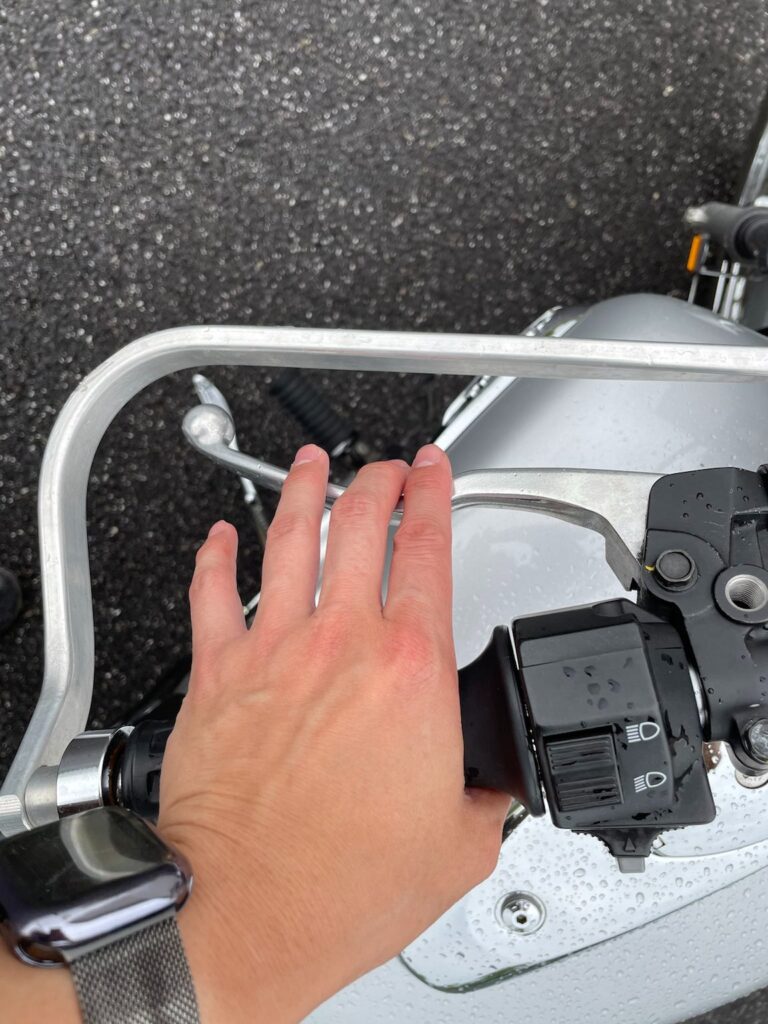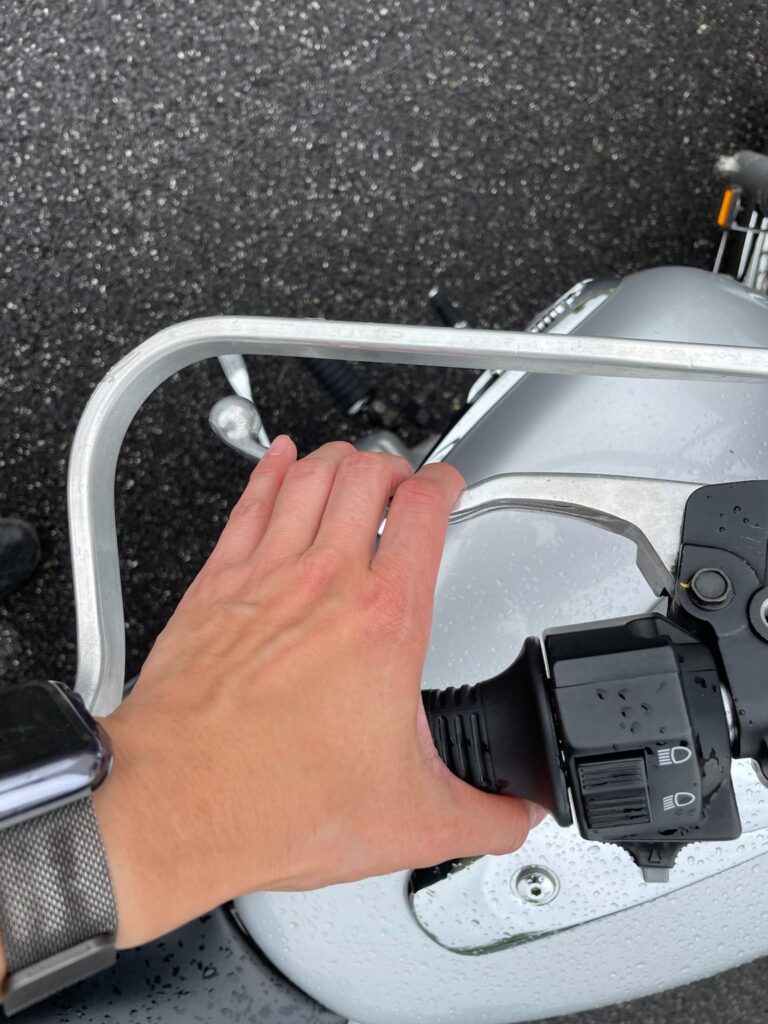I failed, dear readers. I failed.
I went to my long-awaited Motorcycle Safety Foundation / Total Control Beginner Riding Clinic, made it two hours into the practical riding portion, and had to stop.
Not because I dropped the bike, which I did, but because I was unable to master the clutch. See, motorcycles are still generally manual transmission vehicles, with a clutch operated by the left hand, the shifter operated by the left foot, and brakes operated by right hand and right foot. The right hand is also responsible for the throttle, which is the right handlebar grip and rotated towards you to operate it. When you want to go somewhere on your motorcycle, you start in first gear with the clutch all the way pulled in, then slowly let it out in order to actually begin moving forward. At some point as the lever moves outward, you start rolling the throttle towards you. The throttle stays rotated towards you as you move, just like you’d keep your foot on the gas pedal when you drive. You stop by pulling in the clutch and brake levers with your hands and pressing the rear brake pedal with your foot (and the shifter, to get back into first gear). Learning how to do this is foundational to being a motorcyclist. In the picture here, you can see how little of my fingers were able to engage the clutch lever while still having my hand actually on and around the handlebar grips of the loaner motorcycle provided for the class. The right side, with the throttle and front brake, was similar.
Based on this picture, you might imagine how I found it difficult to learn this skill in the limited amount of time I was provided at the class. Impossible, actually, because I could not properly reach the controls to learn the nuanced movements required to successfully perform them and still keep my hands on the grips. It resulted in a lot of stalling, a lot of jumping wildly out of control when the clutch slipped too far out with the throttle cranked enough to move it when the clutch was held at the far end of my reach, a lot of misunderstanding of when my clutch was supposed to be in or out, a lot of stopping too abruptly as I tried to get the brake lever under control, a lot of misunderstanding of when my clutch was supposed to be in or out, a lot of inability to even ride in a straight line as I tried to keep everything about my hands and arms balanced enough to keep the front wheel steady….And, well, when it all stacked up, I dropped my bike. When it became clear that I would not, in the limited amount of time and with the limited amount of coaching provided in class, learn that very basic skill, I decided to – and was somewhat encouraged to – step off the range as without it, I would not be able to progress through the other exercises safely.
I’m disappointed, of course, and sad and upset. I was really excited to get started on my journey as a motorcycle rider, and this was not an auspicious beginning. I’m evaluating how I’ll continue, but here are two things that I wish I’d known and now I do know as I think about what continuing means for me:
Motorcycle fit isn’t merely an issue of being able to reach the ground when you sit in the seat. I wasn’t told until I was already nearly in tears with frustration at my inability to learn and reliably demonstrate balancing the clutch and throttle to move forward slowly, that more of my fingers should have been able to not just reach, but also curl around the levers. I had thought that the “control zone” would have been much closer to the grips and that I wouldn’t have needed that much control at the very far end of my fingers. It would have been nice to have been able to spot that issue immediately when I picked out the loaner I used, although I’m told that the lever reach was approximately the same on all of the motorcycles there (and any provided for this class as it’s given across the state) and that none were adjustable. That seems like an enormous miss on the part of the course organizers, and probably one that makes it enormously difficult, if not impossible, for the very new rider to learn if they have smaller hands like mine. It can be overcome with enough time and experimentation, even if you don’t modify your motorcycle to have a shorter reach (which many, even my instructors personally, commonly do). Which leads me to the next point…
MSF/TC Beginner Riding Clinic / Basic RidingCourse is not actually for beginners. It’s advertised as appropriate even if you’ve never been on a motorcycle before, but the vast majority in my class had at least some riding experience and it was clear that I was holding the class up with my struggles. While we are told not to worry about anyone’s performance but our own, it’s frustrating for all, and distractingly stressful to the student, when they are unable to even get started with an exercise after everyone else has finished. It certainly also encouraged the instructors to teach closer to the middle of the class ability level, which was far over my head. The fact that almost everyone had basic knowledge and experience already meant that after I ended my participation, I found out several very basic points that were not verbalized to me. Some of them are what I described a couple paragraphs above. I either should have come in knowing them, or having experienced them in some way on my own. If I take the class again, I won’t do so until I can already perform all of the required skills even if I can’t articulate how they’re done or when. The class would then simply be for the purpose of formalizing my knowledge and getting my license – which is as it seemed to be for the vast majority of folks in my class.
But even as the universe sets up roadblocks, it also provides inspiration, because my friend Paul Sharp posted this within hours of me stepping out of that class:
“I regularly stand in front of groups of people who are trusting me to train them, prepare them for what might possibly be the worst day of their life. I tell them to find ways to gut check themselves. To get in over their head, and find a way out. That’s how you build indomitable will, a mind set on winning. Find a marathon and enter it. Only got 2 weeks to train? Awesome. Only got 2 days to prepare? Even better. Sometimes gut checking ourselves requires wrecking ourselves.”
So I wrecked myself. And I’m still here. And I guess I’m gonna get back up on that …motorcycle? And try again. Because I’m going to ask you to do the exact some thing one day, when you get yourself in over your head.






